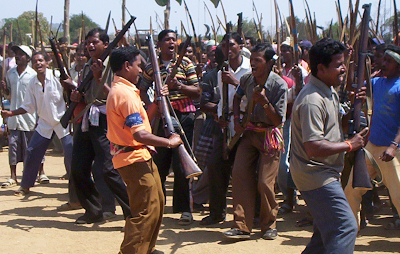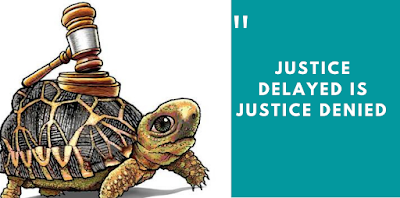Introduction
The Indian legal system, like any other, is designed to uphold justice, maintain order, and protect the rights of its citizens. However, in its pursuit of these ideals, it sometimes becomes entangled in a web of complexities, leading to debates over whether illegal justice or legal injustice is more detrimental to society.
This article delves into the intricacies of both scenarios, exploring real-life examples from India's legal landscape to shed light on this thought-provoking dilemma.
Illegal Justice
Illegal justice refers to the use of extra-legal means or methods that bypass the established legal procedures to deliver what is perceived as justice. Vigilantism, mob justice, and extrajudicial killings are some of the manifestations of illegal justice that have surfaced in India. While these actions might ostensibly aim to punish wrongdoers swiftly, they often result in an erosion of the rule of law, leading to chaos and the violation of human rights.
Examples of Illegal Justice in India:
- Khairlanji Massacre (2006): In this shocking case, four members of a Dalit family were brutally murdered in Maharashtra. The incident sparked outrage and protests due to the alleged caste-based motives behind the killings. The subsequent public anger and demand for swift justice led to an environment where some groups took the law into their own hands, potentially undermining the proper legal proceedings.
- Encounter Killings: The controversial practice of encounter killings involves the police allegedly executing criminals in staged shootouts. While the police argue that they are neutralizing dangerous criminals, critics argue that this often amounts to extrajudicial executions, violating the rights of the accused. The 2004 Ishrat Jahan encounter case is a notable example where doubts were raised about the legality of the police's actions.
- Cow Vigilantism: In recent years, India has witnessed disturbing cases of mob violence carried out by self-proclaimed cow protection groups. These groups often take the law into their own hands, attacking individuals suspected of consuming or trading beef. These actions not only undermine the principles of justice and due process but also contribute to communal tensions and violence.
- Honor Killings: Another manifestation of illegal justice is honor killings, where individuals are murdered by their own families or communities to preserve perceived notions of honor and morality. These acts reflect a lack of faith in the legal system and the belief that taking matters into one's own hands is the only way to address perceived wrongdoings.
- Mob Lynchings: Mob lynchings have been a significant concern in India in recent years. These incidents involve a group of people taking the law into their own hands and attacking individuals suspected of crimes or rumors, often resulting in severe injuries or death. The victims are often targeted based on factors like religion, caste, or other social identities. For example, the lynching of Mohammad Akhlaq in 2015 in Dadri, Uttar Pradesh, over rumors of consuming beef.
- Khap Panchayats: Khap Panchayats are informal, traditional councils found in some parts of rural India. In certain cases, they have been known to issue illegal and regressive judgments, such as ordering honor killings or social ostracization against couples who marry within the same gotra (clan) or caste, in violation of personal rights and the law.
- Vigilante Groups: Various vigilante groups have emerged in India, particularly targeting issues like cow protection and moral policing. These groups take it upon themselves to enforce their own interpretation of the law, leading to clashes and violence. For instance, the activities of "cow protection" groups targeting those involved in the cattle trade.
- Street Justice: Instances of people being publicly humiliated or punished for perceived wrongdoings have been reported. These actions can range from public beatings to forcing individuals to hold humiliating placards as a form of punishment, all without proper legal authorization.
- Caste-Based Violence: The deep-rooted caste system in India sometimes leads to instances of violence, where higher-caste individuals or groups target lower-caste individuals. These attacks can include physical violence, forced labor, and even sexual assault, often in an attempt to assert dominance and control.
Legal Injustice
Legal injustice, on the other hand, occurs within the established legal framework but results in unfair or biased outcomes. This can happen due to various reasons, such as corruption, lengthy delays in trials, inadequate legal representation, or discriminatory practices within the justice system. While the facade of legality is maintained, the end result fails to uphold the principles of justice and equality.
Examples of Legal Injustice in India:
- Delayed Justice: One of the most significant issues in India's legal system is the problem of delayed justice. Cases can drag on for years or even decades, leading to prolonged suffering for the parties involved. High-profile cases like the Bhopal Gas Tragedy case, which took over 25 years to reach a verdict, highlight this issue.
- Wrongful Convictions: Instances of individuals being wrongfully convicted due to flawed investigations, unreliable evidence, or coerced confessions have been reported. The lack of proper safeguards and inadequate legal representation can contribute to such injustices.
- Custodial Torture and Deaths: Reports of custodial torture, abuse, and deaths in police custody have raised concerns about the protection of citizens' rights. The lack of effective oversight and accountability mechanisms can contribute to such incidents.
- Discriminatory Laws: Some laws in India have been criticized for being discriminatory, particularly towards marginalized communities. For example, Section 377 of the Indian Penal Code criminalized consensual same-sex relationships until it was decriminalized by the Supreme Court in 2018.
- Ineffective Implementation of Laws: Even when laws exist to protect citizens' rights, their effective implementation can be lacking. For instance, laws against dowry-related violence and harassment exist, but such incidents continue to occur due to weak enforcement.
- Lack of Access to Justice: Many marginalized and vulnerable populations face barriers in accessing justice due to factors such as poverty, lack of education, and geographical constraints. This can result in their rights being violated without recourse.
- Excessive Use of Force by Authorities: There have been instances of excessive use of force by authorities, including during protests or conflicts. These incidents raise concerns about human rights violations and the disproportionate use of force.
- Judicial Backlog: The Indian courts are burdened with a massive backlog of cases, which can lead to delayed justice and frustration among litigants. This backlog can also lead to pressure on judges to prioritize certain cases over others.
- Selective Prosecution: There have been accusations of selective prosecution, where individuals from certain backgrounds or political affiliations are disproportionately targeted while others escape legal action.
- Land Disputes and Forced Evictions: Land disputes and forced evictions, particularly involving marginalized communities, have raised questions about the fair treatment of citizens and the protection of their property rights.
- Misuse of Anti-Dowry Laws: India's anti-dowry laws were
introduced to protect women from harassment and abuse. However,
instances of false accusations and misuse of these laws have been
reported, leading to legal injustice against men who may be wrongly
accused.
The Complex Balance
Conclusion
In the Indian context, the debate between illegal justice and legal injustice is not about choosing one over the other but about striving for a balanced and equitable system that upholds the principles of justice, equality, and human rights. Addressing legal injustice requires comprehensive judicial reforms, including improving the efficiency of the courts, ensuring adequate legal representation, and combating corruption. Simultaneously, preventing illegal justice demands fostering a culture of respect for the rule of law, promoting awareness, and strengthening the accountability of law enforcement agencies. The ultimate goal should be a legal system that ensures swift, fair, and impartial justice for all, regardless of their circumstances.

























